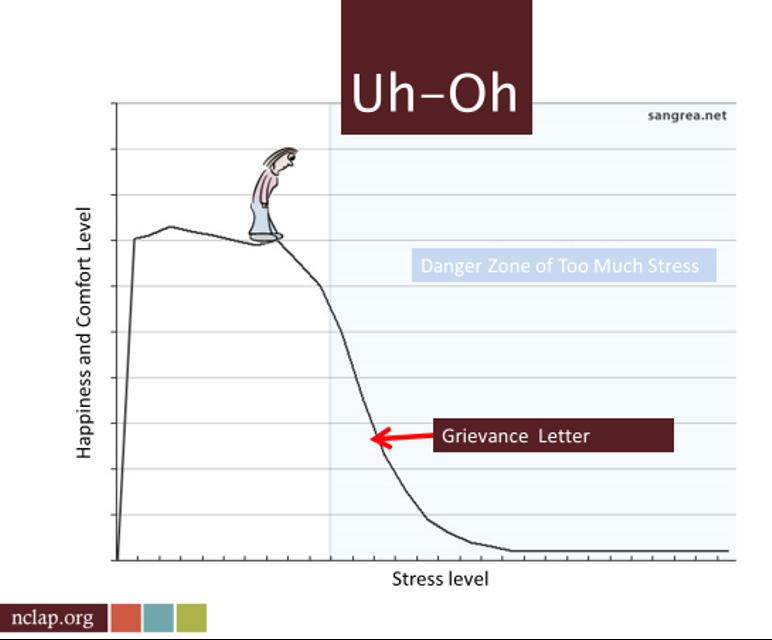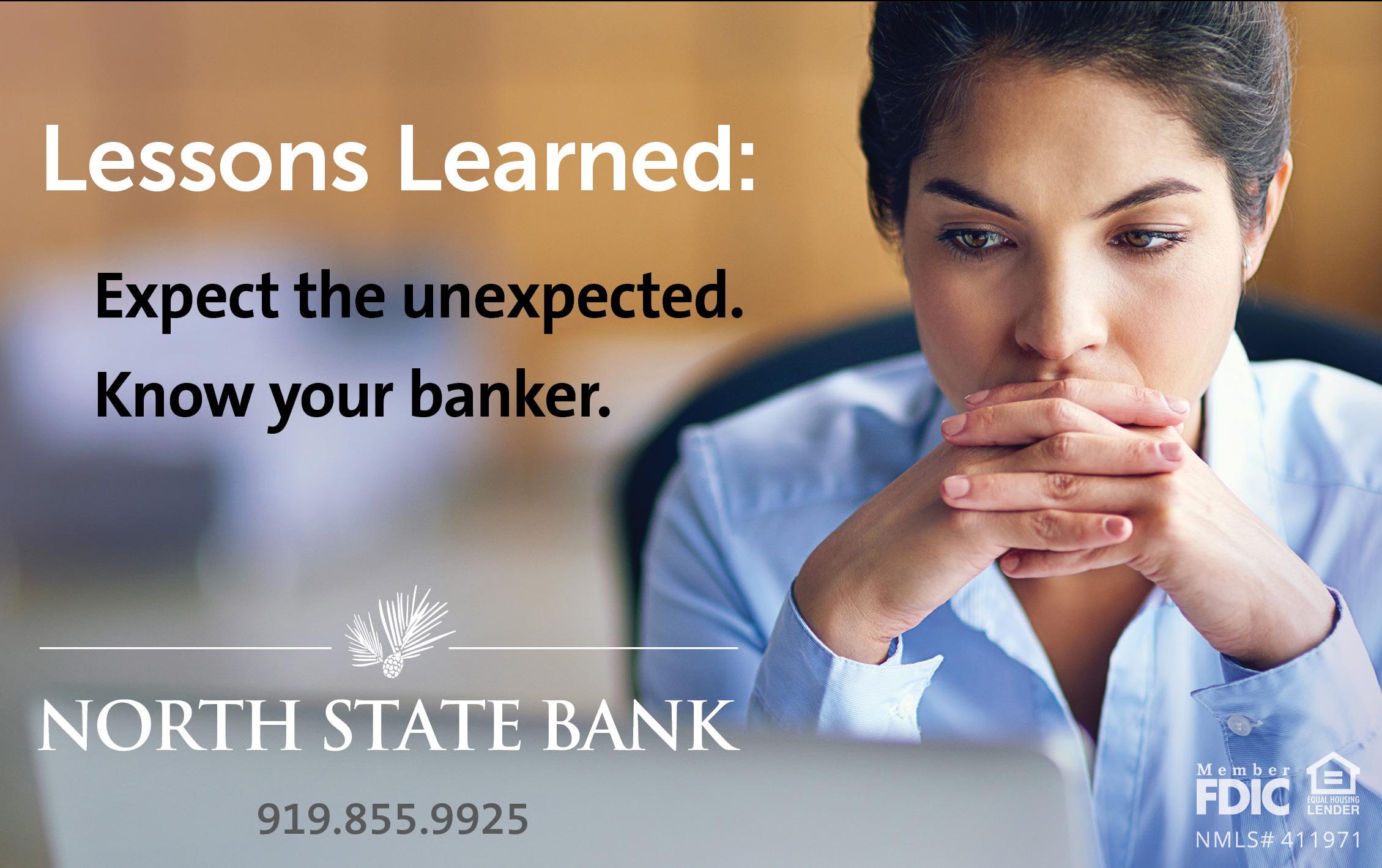
8 minute read
LAWYER ASSISTANCE PROGRAM
COVID – LIKE ORANGE JUICE CONCENTRATE
ROBYNN E. MORAITES, ESQ. | EXECUTIVE DIRECTOR, NC LAWYER ASSISTANCE PROGRAM
Advertisement

LAWYER WELL-BEING IS A POPULAR REFRAIN THESE DAYS, but what is it really? Lawyer well-being influences and correlates to ethical behavior, professionalism, and competence. It can be tricky to discuss lawyer well-being because there are not objective, measurable well-being standards. We are only alerted that something is amiss when a lawyer begins to have malpractice claims, ethical violations or behaves unprofessionally enough that colleagues start to notice. It is often helpful to frame the discussion on a well-being continuum rather than to think of well-being and impairment as either/or propositions.
Lawyers and judges move along this continuum over the course of a career. Where an individual falls on the continuum at a given point in time can be influenced by a number of factors ranging from the stress of a certain legal matter or life situation, say the death of a close family member, to medically based illnesses like depression or alcoholism – enter stage left…or a global pandemic. By the time a lawyer is committing malpractice or violating the Rules of Professional Conduct, he or she has slid very far down the well-being continuum. The asterisk is an indicator of where a lawyer in a cycle of impairment usually hits the regulator’s radar. Graphically illustrating this another way, here is a slide often used in LAP’s compassion fatigue/burnout CLE presentation:
The pandemic has thrown us all into the “Danger Zone of Too Much Stress” and slid all of us further to the left on the well-being continuum. Recent research has verified that the pandemic has taken a far greater toll, emotionally and psychologically, on women and minorities. Across all demographics, anxiety is at an all-time high. We’ve seen a huge rise in day drinking. Where we once were crawling out of our skin from having to suddenly stay at home, research is showing a collective social anxiety about gathering in person again (this is more than feeling awkward…think…dread). All of this makes sense when understood in the larger context of our collective psychology.
Deeply embedded in the human psyche is a survival-based instinct around the need to feel in control. For our survival as a species, we rely upon our ability to predict future circumstances. When we can predict, we can then plan and prepare. But when we cannot predict, plan and prepare, our brain takes off in fight-or-flight mode. To our brains, we have spent the last 15 months running for our lives from a saber tooth tiger.
We spend a fair amount of time educating the bar about the effects of stress, including the fight-or-flight response. In a great video by Nat Geo entitled Stress: Portrait of a Killer(available on YouTube), the opening scene shows a lion chasing a zebra. It also shows a man holding a briefcase waiting to get on the subway. The narrator explains that for the zebra, the fight-or-flight response is over in about three minutes. Either the zebra has gotten away or it’s over for the zebra. The narrator goes on to explain that the man on the subway is experiencing this heightened sense of fight or flight as well. But what is supposed to be a short-term, acute, survival response is experienced by many of us as a chronic day-in-and-day-out condition.
Lawyers and judges are uniquely positioned for a lifetime of this chronic day-in-and-day-out fight-or-flight condition. We often say, and we have published in our law school brochure, “You are having a normal reaction to an abnormal situation.” The legal profession is a super abnormal situation, right from the forced-curve get go. With its winner-take-all adversarial nature, its unrelenting demands and the inherently competitive people who are attracted to it, it creates a pronounced and prolonged abnormal situation for its members. And then we added COVID to the mix, which, for many of us, flooded our surge capacity. See, e.g.,Your Surge Capacity is Depleted and It’s Why You Feel Awful.



So, we have to take it as a given that none of us is at the top of our game and thriving right now, even as life resumes to pre-pandemic activity.
Let’s talk about the concept of resilience. Resilience is the capacity to endure hardship and spring back; it is the capacity to bend without breaking. Resilience is not an innate quality that one is either born with or without. Rather, it is a set of skills that can be practiced and learned. People in recovery often talk about the “tools of recovery. ” This is a kind of coded speech for a set of resilience skills that is taught and learned on the recovery journey.
Resilience skills are a collateral byproduct or effect of practices like yoga, mindfulness, meditation, letting go and accepting what we cannot change (aka the serenity prayer). If you want to see well-being practices being put to the test day in and day out, just take a look at our active volunteers. They are walking demonstrations of the power of resilience tools and skills.
In fact, when the pandemic first forced everyone into seclusion, LAP volunteers documented how they were applying resilience tools that they learned in recovery to the situation of the pandemic. That tool kit is available on LAP’s website. Our CLE titled Mental Health and Well-being During Covid, is essentially a crash course in resilience practices, and our handouts page has another set of tools available for anyone. I encourage you to visit these webpages to peruse these tools. Think of it as a pocketknife and only use those tools that speak to you. The key is practice.
It is one thing to read about a 32-second square breathing technique. Reading about it may be interesting, but without practice, it will do you no good at all. It is quite another thing to stop four or five times a day to do this simple 32-second practice to calm and stabilize your nervous system and trick your body into thinking it is more relaxed than it is.
In some ways, the gift of Covid, is that it brought into sharp focus the chronic fight-or-flight psychological process we experience in the legal profession every day. Like orange juice concentrate versus an orange, however, Covid has forced us to immediately put some of these resilience practices into play to maintain our collective sanity. But the truth is, we all need them, all the time. Law is a tough profession dealing with the big uglies in life. To the extent we can leverage the most unfortunate circumstance of Covid to begin actually using some of these practices, the less despair we will be feeling as life resumes at its once again breakneck speed.
If you find you are having difficulty navigating, you are paralyzed by anxiety, you are day drinking or whatever, give us a call. You are not alone. In fact, you will be surprised to learn you are in quite good company. WBF


BarCARES®

BarCARES can make a difference for Judicial District & Local Bar Members!
BarCARES is a confidential short-term counseling, coaching and crisis intervention program created as a cost-free way of helping attorneys locate assistance to deal with the problems that might be causing stress. BarCARES is provided cost-free to members of bar groups that establish a BarCARES program. A number of judicial district and local bars, law schools and other bar related groups across the state have already chosen to offer this program.
BarCARES of North Carolina, Inc, (BCNC) is a nonprofit corporation that works to expand the program to attorneys throughout North Carolina, and it monitors the overall BarCARES program operation. BarCARES, endorsed by the North Carolina Bar Association, is made possible by funding from bar groups that establish a BarCARES program, BCNC, the North Carolina Bar Association and its Foundation, and Lawyers Insurance Agency.
BarCARES can be used for problems such as:
Personal Issues
• crisis intervention • depression and anxiety • substance abuse (drug or alcohol) • financial concerns • career counseling
Family Issues
• marriage or relationship issues • children or adolescents • parenting • family conflict
Work Functions
• professional stressors • course related stress • conflict resolution
BarCARES provides members of established programs in judicial districts, bar associations, law schools and organizations up to three free visits each year. In some programs the visits may be available to family members. Contact the BarCARES Program Coordinator for information about which BarCARES services are available to you.
BarCARES Initiative extends a statewide program offer to any member of the NCBA who lives in an area where BarCARES is not yet available. This is a one-time benefit of three sessions under the program. You may contact the BarCARES Coordinator for information about which BarCARES services are available to you.
BarCARES sessions can be used to provide assistance in resolving problems or accessing the appropriate source of help. Sometimes three sessions will be enough to take care of a problem. If it looks like the problem may require a longer term solution, the initial visits may be used to help identify the problem, to develop goals and a plan, and to access an appropriate resource, often covered under your health insurance plan. Every effort will be made for you to see a counselor who is also an approved provider under your group insurance in the event you wish to continue after the program visits are used.
BarCARES is a confidential program, no one will know if you access the program but you and anyone you choose to tell. No personally identifiable information is shared with the BarCARES Board; the associated state, local voluntary or judicial district bar association; or any other entity without the permission of the BarCARES client/ user. Additionally, any health related information included in the sessions will follow federal HIPAA Privacy & Security Rules as stated in HRC’s HIPAA Privacy & Security statement.
BarCARES program benefits are accessed by contacting the BarCARES Program Coordinator at HRC Behavioral Health & Psychiatry, PA, at 1.800.640.0735. You may also contact the BarCARES Program Coordinator just to ask questions about the program and the services it provides.
confidential counseling for the legal community and their families 1-800-640-0735 | barcares.ncbar.org










